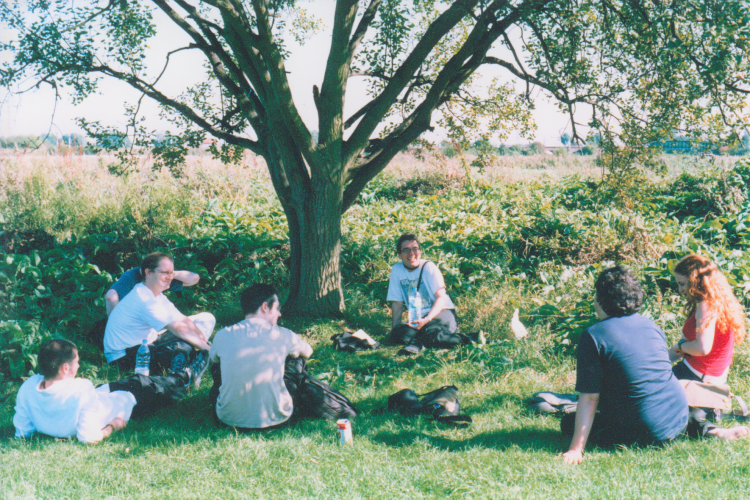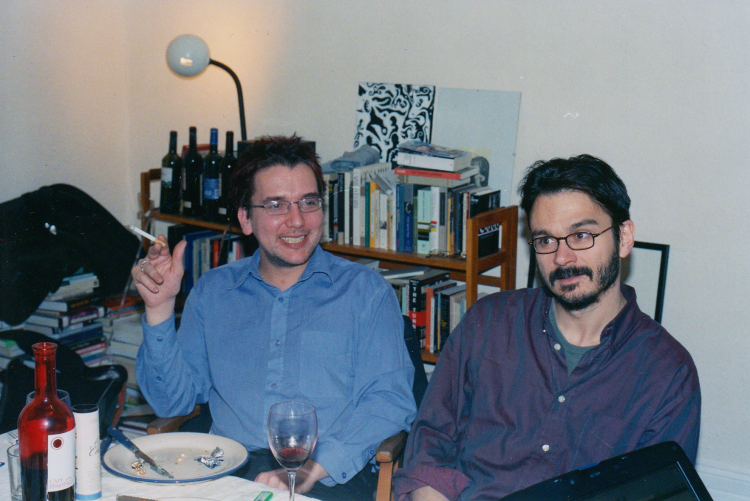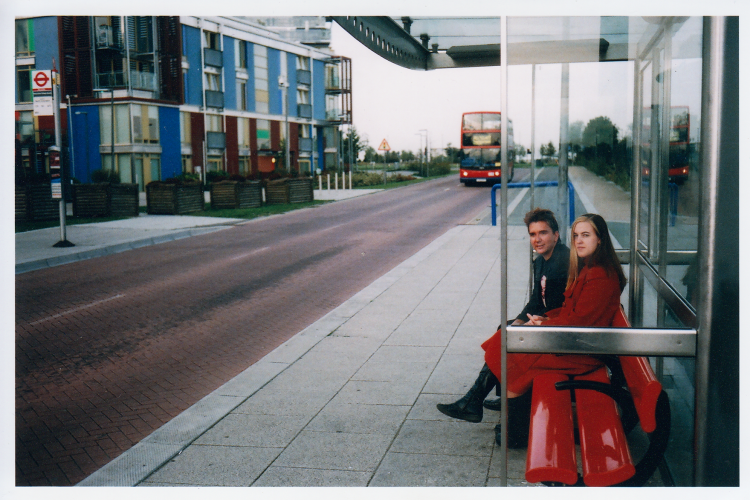 Mark on a seaside trip, c. mid-2000s
Mark on a seaside trip, c. mid-2000s
There is a line in Byung-Chul Han’s book The Burnout Society that makes me think of you: ‘the violence of positivity does not deprive, it saturates; it does not exclude, it exhausts.’ You were the person who diagnosed this condition better than anyone else, always. You lived the violence of positivity even as you did your best to harness it. You refracted everything, engaged everything and everyone. You dissolved cynicism in energy. You could go to sleep on the floor, like a lemur, and wake up and continue the conversation as if sleep was but a momentary blip between real desire, the desire for perpetual engagement, for never-ending conversation.
 Mark and Alberto, c. mid-2000s
Mark and Alberto, c. mid-2000s
I had a dream about you the other night. You were walking along a beach. I was looking down at you through a pane of glass, from a high tower, or perhaps it was a lighthouse or a watcher’s cabin. You were alone, isolated in thought. Absurdly, though not so absurdly, because you also loved to do this, you paused for a moment, danced for a second, and then carried on walking along the edge of the sea. Later, you appeared in the tower with me, and we talked calmly about many things. You told me you missed your daughter (although you never had a daughter), and we talked about ‘feminine pressure’, which is something we always used to discuss when you were here: you always sought it in the music you listened to, in your thought and work, and in your life. Everything without women was doomed to flatness, you thought – music, philosophy, friendship.
 Mark holding court on a walk with Siobhan, Darren, Michael, Bruce and others
Mark holding court on a walk with Siobhan, Darren, Michael, Bruce and others
I want to tell you what a beautiful man you were. How your hatred of what you once hilariously called ‘the solitary urinal of male subjectivity’ played out in your love of female company. There is no man I’ve ever met who loved women more than you, no one who encouraged the women around you to think that they had something to say, that they weren’t just someone’s girlfriend, no man who enjoyed the company of women more. I want people to know how kind you were, and all the work we did together, and how astounding you were. You gave so much time and passion to so many people. I can’t help but think what you did energised you, but it also depleted you, and that you sacrificed yourself in the name of revitalising the world. In the depths of my despair in the months following your death, I wondered if you had been sent to us for reasons we can’t understand. I always thought we would have time to make it up, to see one another again. If grief has a shape, it might be being trapped in the inside of a triangle, bouncing from grief to guilt to wanting to be worthy of your death, a thousand times over. If triangles had a God, it would look like a triangle, Spinoza said, and we laughed about this when we taught it, as we laughed about so many things, and you always looked so young when you laughed, and so naughty, and so sweet.
 Mark and Ray
Mark and Ray
If you recommended something to listen to or read, you would bring it round, and you never forgot. Everything flowed through you, and you changed everything, and it didn’t matter where we were – eating pie and mash in Orpington shopping centre between classes at the FE college where we taught, on the floor in a flat, out on a walk, in a club. You dissolved all inertia in an ecstatic flurry of thought. But you were never monological, and you never spoke down to anyone, you only built people up, gave life to their ideas, however nascent and silly they were. You wanted people to feel and think what you’d experienced, to open things up, to make new connections. You put people together, and you were never precious, or jealous, or possessive. Connectivity was an act of care for you.
Since you have gone I find it hard to go back to your writing. I think it is because there is still so much life in your words, but so much ghostliness too. And it was just so good, it just is so good. You captured exhilaration in writing like nobody else. The ‘libidinal’ was one of your favourite categories. You could always feel when something had it, and when it didn’t. But we are surrounded by delibidinising things, and you were right about that, even though some people really didn’t want to hear it. And it is a class war, you were right about that as well. And your question ‘how do you hold immense wealth and power while also appearing as a victim, marginal and oppositional?’ was the right one, which is why it infuriated the people it identified. I wish I could say that things had changed, but they haven’t. I don’t know how we break their power, but I know you never stopped thinking about it, and you never stopped trying to find any escape route out of their logic, even when it hurt you to do so.
 Mark and I
Mark and I
I wish you knew how much people valued you, and how much they would have done to protect you. I would have done anything. Nothing is the same. I remember we went to the graveyard in Kent with the thirteen lozenge shaped graves, the graves of children, the ones Dickens describes. And you were so moved, and you wanted to show them to us, and we stayed there for a long time, with the daffodils and the graves. And today is the thirteenth, and you have been gone for a year, and I miss you, and everyone misses you, and I could write about a hundred more things that we did, and about things you said, and all the things you thought and you felt, and I want to be worthy of you because you were the best, and we adored you, and we adore you still, and we always will.